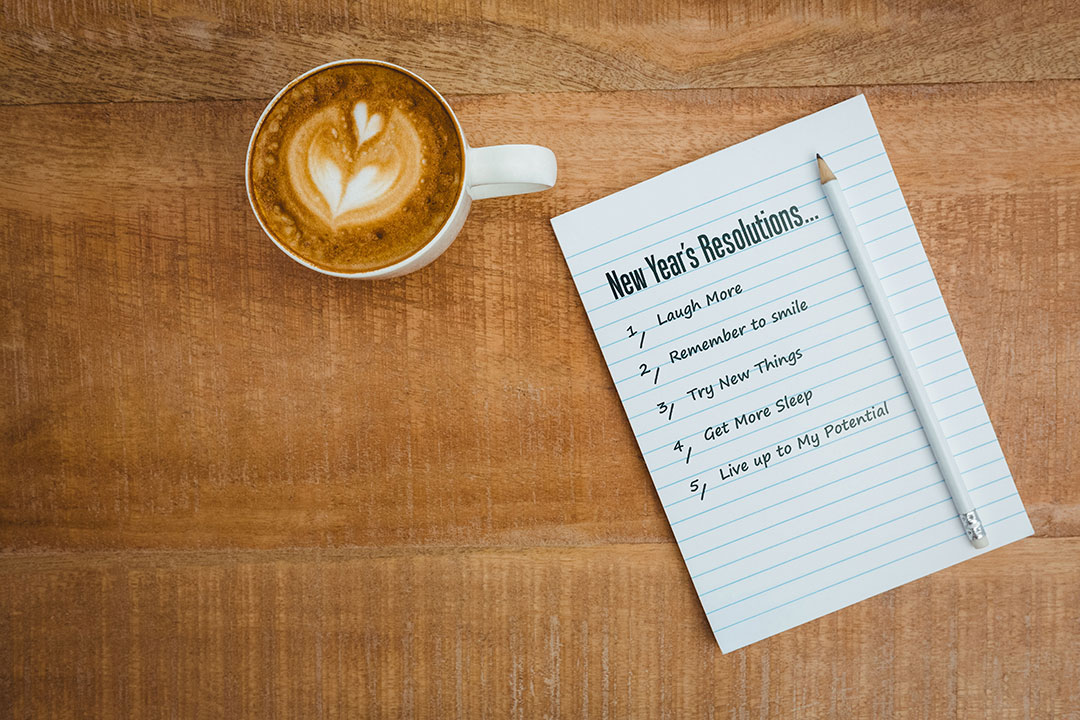The physical and mental benefits that come with a good night’s sleep should put it at the top of anyone’s list of 2020 New Year’s resolutions.
Think of a good night’s sleep as the key that unlocks many of the other New Year’s resolutions you have in mind.
Lose weight.
Improve Fitness.
Run a race.
Get a promotion.
Get a raise.
Write a book.
Check. Check. Check. Check. Check. Check.
Quality sleep can help you reach all of those goals easier and faster.
And we already know those goals are hard enough to reach on their own. So why not make sleep your number one New Year’s Resolution to help you see those other goals through more successfully?
Why Sticking With Your Resolutions This Year Requires Better Sleep
It’s likely you make a New Year’s Resolution every year. It’s a common tradition, and if you’re not consciously announcing your goals as resolutions, you’re likely creating a mental note to live a healthier and happier 2020.
Your goals whether labeled a resolution or not, are generally the same as everyone else’s goals. You want to get into better shape, lose weight, create more financial success or find more energy to do the things you love. This is according to a recent survey. Seeing those resolutions through is often a different story.
This same survey reporting on how similar everyone’s resolutions are, all discovered that more than 36% of Americans drop their resolution within one month. Mid-year, that number skyrockets to 81.3% of people who ditch their resolutions. Sound familiar?
That’s where prioritizing sleep and sticking with the resolution can pay dividends.
Sleep Increases Ability to Lose Weight
Sleep is critical to managing your weight. Sleep affects the two hormones, leptin and ghrelin, that control the feelings of hunger and fullness. Leptin tells your body when you are full, and ghrelin tells your body when you are hungry.
Without proper sleep, your body produces less leptin and more ghrelin which tells your body you’re hungry, often causing you to overeat. More sleep means more leptin, and if you’re looking to lose weight in 2020, fewer calories in is often the key to success.
Sleep Deprivation Undermines Dieting
Sleep deprivation not only undermines dieting by contributing to hunger, but also because sleep loss hampers the body’s ability to shed fat according to research from the Annals of Internal Medicine.
If you struggle with any form of sleep deprivation, you’ll experience more hunger with less ability to shed fat. On top of all that, lack of sleep can make you too tired to exercise, which can also contribute to weight gain. This is clearly not a winning combination to help you with your weight loss goals.
In short: if losing weight and getting in better shape are important to you in 2020, getting at least 7 hours of rest each night and reaching REM sleep is essential. Here are the Top 5 Tips to Help You Fall Asleep and Stay Asleep. If you’re not sure how to reach REM sleep, find out How to Use Your Sleep Cycle For Your Best Sleep.
Sleep Improves Performance At Work
Sleep doesn’t only benefit you physically, it improves you mentally as well. Your brain needs plenty of rest to function at full capacity. Do your goals require you to think better or require more concentration?
If you answered yes, you’ll want to focus on improving your sleep.
Sleep is one of the most critical foundational elements to improve mental capacity. So if your goal is to write a book, earn a professional certification, learn a new skill, or any other number of things you may want to accomplish, you need a sharp mind.
A 2017 study in Nature showed neurons in your brain fired slower and weaker when you’re tired than when you’re well-rested. This results in your memory and cognitive skills – like your ability to absorb information and form a response – performing worse than you’d like.
Reduced thinking ability and memory are precisely what you want to avoid when your goals are centered on excelling at work.
Neurons that fire slower, also slow down reaction time. This affects everyone. It affects someone who works in an office and needs to make critical business decisions as much as someone who drives a truck and needs to react quickly on the road. In both instances, you want to make sure you get good sleep.
Success Requires Sleep
Sleep’s critical role in helping you function at your best is evident to those at the highest levels of the business world. Amazon founder and CEO Jeff Bezos, for one, understands how important sleep is to running his $900 billion company.
“I prioritize [sleep],” Bezos said last year. “I think better. I have more energy. My mood is better.”
He continued: “As a senior executive, you get paid to make a small number of high-quality decisions. Your job is not to make thousands of decisions every day. Is that really worth it if the quality of those decisions might be lower because you’re tired or grouchy?”
You don’t need to be a senior executive to benefit from prioritized sleep though. Sleep impacts everyone – and it’s increasingly a serious problem.
Sleep Deprivation Affects Half the American Population
Approximately 50% of Americans are estimated to be sleep deprived.
Sleep deprivation and difficulty sleeping has also been linked to reports from 90% of people who claim to suffer from depression.
Studies show people experiencing depression lose their job(s) more often, demonstrate more on-the-job functional limitations, and are absent more often than their nondepressed coworkers. So, in addition to the shorter term effects of sleep deprivation and their effect on your professional goals an increased likelihood of experiencing depression may have an even stronger effect.
Sleep deprivation for most adults means anything less than seven hours of quality sleep at night. If you aren’t getting the seven hours of sleep long recommended by sleep experts, this is the year to commit to making that change, and it may be easier than you think.
What Sleep Habits Should You Adopt In 2020 For This Year’s New Year’s Resolution?
If you choose to improve your sleep this year, there are small incremental improvements you can make to your sleeping habits right away.
These new habits can ensure you get the right amount of sleep and improve sleep quality. They’ll also improve your physical and mental health. Some of the most important things you can do include avoiding caffeine and alcohol several hours before bed. Both make it difficult to get into deeper more restful sleep.
“Create an environment that establishes the right conditions that you need for sleep,” Dr. William H. Noah, Medical Director of Sleep Centers of Middle Tennessee, said. “Make your sleeping environment cool, quiet, dark, comfortable, and free of interruptions. Check for and remove distractions — blue light, heat, noise, or other things that may cause stress. Consider adding earplugs, blackout curtains, or white noise to your bedroom.”
These changes can foster better sleep and make for an easy resolution heading into 2020.
Another easy step you can take is to create a sleep schedule. By outlining when you want to be in bed and when you’ll turn the television off, it will help keep you invested in your resolution. This is something that’s been tied to more than just the health benefits we’ve already mentioned.
Research shows that people who reach very old age—85 and beyond—share certain characteristics about their sleep patterns:
- They maintain very regular sleep schedules, going to bed and waking at the same time, every day. They retain more time in deep, slow-wave sleep.
Seek a Sleep Specialist When Good Sleep Requires More Than Habits
For some, getting quality sleep and enough of it may require more than the adoption of these recommended sleep habits. There are some challenges that may require a visit to a sleep specialist in the New Year.
Snoring is one of those challenges that may need a sleep specialist’s evaluation to determine if something more serious is keeping you from the restful sleep your body needs.
About 40% of the population snores and 80% of those people suffer from Obstructive Sleep Apnea. Therefore, even if you get more than 7 hours of sleep, OSA may leave you feeling lethargic, anxious and irritable.
Brain fog and a diminished sex drive are two other common symptoms.
While this is a burden for millions of Americans, it doesn’t have to be. If needed, getting a sleep study or a sleep test from Sleep Centers of Middle Tennessee may help pinpoint the issue leading to your bad night’s sleep.
A solution to your sleep deprivation is out there, and your body and mind will benefit from making this a priority in 2020.
As the New Year starts, adjusting your sleeping patterns — or checking with a specialist about how to get a better night’s sleep — can help make the rest of your resolutions a reality.



